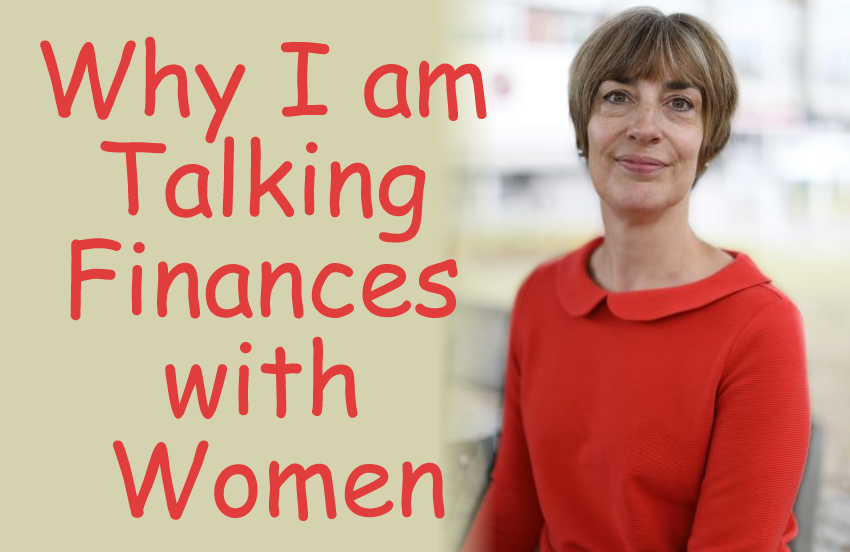For the first time advo is to feature a blog. Carol Haswell is a financial adviser with a novel approach and insight to engaging more women with personal finance. We will be following Carole in her mission to peel back the confusion around managing finances. Here we include a copy of her first blog. More from Carole soon.

Women save, men invest: Carole Haswell (DipPFS) talks finances with women:
The ‘back’ story
6pm on 14 February 2003; Gracechurch Street, EC1: It’s Valentine’s Day 2003 in the City of London. Love and money are in plentiful supply but a cab can be had for neither. Arms burdened by gifts and flowers – and body burdened by eight months of pregnancy – I resign myself to a tube journey home. Tomorrow will be the first day of my maternity leave. And today, I promise myself, will be my very last day in the male-dominated world of finance.
Fifteen years and two children later; a soulless conference room just outside Reading: By forces that I have yet to fully understand, I find myself in a room some four-fifths populated by male financial advisers. I am one of very few women present who have come to listen to a man who knows everything there is to know about tax (yes, I know. I broke my promise. It happens).
At the time of this event I am almost half way through a set of exams that will enable me to become a financial adviser myself. Still new to the game, I put all my energy into keeping up with the speaker’s subject matter until one sentence, in particular, makes me look up from my notes:
“Blah blah blah complicated tax stuff…yada yada: he thinks they should invest the capital in long-term growth assets, she wants a new kitchen…blah blah blah”.
Wait, what? Really? Are we actually still doing this stereotyping? Oh my days, any minute now we will be invoking some fictional widow whose understanding of the family silver has never gone further than the need to polish it.
(Generations of speakers on personal finance matters have used this poor old dear in their examples – the unspoken assumption being that, without a husband to manage the finances, she is going to need a professional hand to steer her.)
Well, Reader, I can report that I am not disappointed, for just five minutes later, sure enough, out she comes.
I consider excusing the speaker on account of his advanced years, until I realise that he is just two years older than me. We are very definitely of the same generation but he is talking like my Grandad used to. Has nothing changed in these 15 years? Nothing at all?
The ‘what’s it all about’ story
Why does it matter?
Now, maybe you would view the stereotypes that got me bristling as just a harmless way of putting a point across. And to be fair, the other women in the room didn’t so much as blink, let alone roll their eyes in indignation. Yet that is part of a problem in itself: if we keep on wheeling out quips like these, every new generation of financial professionals is going to accept the sentiment behind them as the norm. And so another 15 years goes by. And another. And all the while, women are being alienated by an industry that still conducts itself as though the men are in charge of the money.
Women save, men invest
To be fair, Big Finance is waking up to the idea that women represent an as-yet untapped market when it comes to selling investment products. There are plenty of surveys and reports circulating right now that bear out the fact that women prefer not to engage in this sort of risky activity, thank you very much, seeing saving as the better option.
It’s not hard to see that maybe the saving mentality came about because, in the past, women have been in control of the smaller parts of household finance – the day-to-day budgeting and the like – and so they have, quite rightly, taken a cautious approach. They are more likely to ‘save’ any surplus cash because they simply don’t know when they might need to get their hands on it in a hurry.
And besides, if you were going to stay married forever to a man whose company pension was guaranteed to keep you safe until you both died, then perhaps you didn’t think investing was anything that concerned you.
Caution no longer cuts it
But, hello! Times have changed. This cautious approach is almost certainly not in our best interests any more – not least because the type of pension that offers a secure stream of income all your life is becoming a relic of a bygone age. Even if we contribute to our own pension all through our working lives, we will only have a finite pot of money at the end that somehow has to last us forever – and we don’t even know how long that ‘forever’ will be. Add to that the fact that we are all living for longer – and women, of course, tend to outlive men – and you begin to see that putting your savings under the mattress no longer cuts it.
Who can we turn to?
So, are we likely to see women flocking to their local financial planner to find the best way of securing their futures any time soon? As things stand, I think the answer to that is, no. First, there is the obvious fact that women do not have control of as much money as their male counterparts, which is borne out by the well-documented gender gaps in pay and pensions. But even where these gaps are narrowing, there is the second problem of the way that the world of investing presents itself in its sales literature and adverts. The use of jargon, the assumption of knowledge, the emphasis on ‘performance’ and ‘solutions’ rather than real-life scenarios… these all contribute to a sense that this industry is not really talking to ‘me’.
You can bet your bottom dollar that in the coming years the big corporates will be unfurling their sticky advertising tendrils in a bid to convince us women that buying into the same neatly packaged investment and pension products as our menfolk is a sure-fire way to success in life. But, without proper guidance and education, this is going to fall on deaf ears. If all this effort at the top of the industry is about persuading an already successful, good-looking woman in an advert that she could grow her wealth by a bit more, then, go ahead, Big Finance – fill your boots. But, frankly, I don’t think there is anywhere like enough effort going into understanding what women want or need from a service that has, for so long, danced to a male tune.
The ‘now’ story
Present day; where I am now: In the intervening months since that Reading conference, I have ploughed on with – and successfully completed – the qualification that I need to become a financial adviser. But ever since that conference, I have been struggling to imagine myself part of a profession that is offering the same old same old in a pattern that leaves many women cold and does nothing to educate. When women do come through the door for advice (and figures show that they are far more reluctant than men to seek financial advice) the assumption is that they will be happy to take what’s on offer. Even if it wasn’t really designed with them in mind.
The ‘future’ story
A vision for the future: So, as I go through my training, I am considering the notion that maybe women take a different approach to money and long-term finance from men. Or, at least, that they have different needs at the outset regarding the way the information is presented to them and how they relate to it.
I’d love to build an advice process that all women will be comfortable with. I know of myself that I tend to be pragmatic around my personal finance – less wowed by notions of ‘performance’ and ‘solutions’ and more interested in the big picture of my life. And other women that I talk to echo this with questions like: Will I have enough? Should I be worried? What can I do to secure the future? What even is a pension?
Small, informal workshops: The last thing I want to do is build my own stereotypes about what women need from the profession. That is why I am currently talking – and listening – to women in small, informal workshops where we can work out if there are gaps in our knowledge and what the barriers are to us engaging fully in our financial future.
The aim of the workshops is twofold:
- To kickstart a conversation about why women are not as engaged as they could be in understanding their future needs
- To deliver some basic financial understanding in an environment where no question will ever be considered stupid
Through talking to women, I want to put the emphasis on listening so that, together, we can find an approach to financial planning that is useful, easy to understand and, above all, relevant.
I am blogging along the way about topics that are raised in the workshops in a bid to keep the conversation going. I warmly encourage you to join in….
If you would like to read any more of the blogs, then visit http://talkingfinances.co.uk/with-women/ or email Carole on carole@talkingfinances.co.uk


